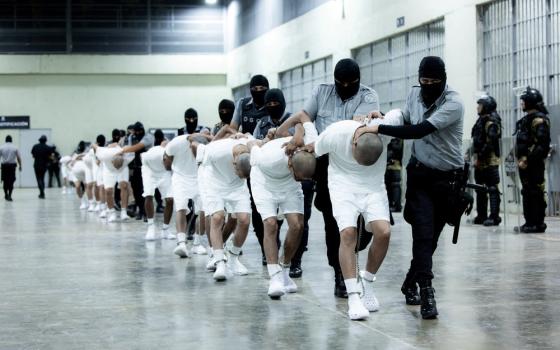The prophet Isaiah boldly challenges us to choose the way of fasting most acceptable to the Lord: "Releasing those bound unjustly ... setting free the oppressed ... sharing your bread with the hungry, sheltering the oppressed and the homeless, clothing the naked when you see them, and not turning you back on your own."
If we honestly examine our consciences -- a healthy Lenten exercise -- many of us will come to the conclusion that we can do more -- probably much more -- to share our bread with the hungry, shelter the homeless and set the oppressed free.
Excellent organizations like Catholic Relief Services and Bread for the World can help us improve our outreach.
In his social justice encyclical Populorum Progressio ("On the Development of Peoples"), Pope Paul VI boldly wrote, "Each man must examine his conscience, which sounds a new call in our present times. Is he prepared to support, at his own expense, projects and undertakings designed to help the needy? Is he prepared to pay higher taxes so that public authorities may expand their efforts in the work of development?"
Increasing taxes, even for the destitute, is a tough sell anytime, especially during these difficult days. But the Lord who said, "For I was hungry and you gave me food," is calling us to meet the basic needs of our suffering brothers and sisters -- no excuses.
Furthermore, this moral obligation to assist the vulnerable and poor to the best of our ability is not only an individual duty, but is also a serious obligation for the nation and the nation's government.
Here, Pope Paul continues: "The same duty of solidarity that rests on individuals exists also for nations: 'Advanced nations have a very heavy obligation to help the developing peoples.' "
Yet the United States and many other economically advanced nations have slashed essential funds from domestic anti-poverty programs and continue to provide only a very small percentage of their budget to life-saving projects that help the earth's poorest people.
The United States gives only about 0.6 percent of its annual budget for poverty-focused international assistance.
This is certainly not an adequate response to God's call to share our bread with the hungry, to shelter the oppressed and the homeless, to clothe the naked and to not turn our back on our own.
In 2005, James Morris, then executive director to the United Nations World Food Programme, told a gathering in the Indianapolis archdiocese that about 18,000 children in the world die every single day from hunger and hunger-related diseases. And he added: "That doesn't have to be."
He said if about $7 billion a year was put toward ending child hunger, it would end. No one, absolutely no one, should have to suffer from hunger. And wealthy nations -- even the U.S. alone -- could end this scourge upon so much of humanity.
But can't we at least feed every child? Can't we at least muster enough compassion to demand that our government divert the relatively tiny amount of $7 billion from the blotted $1 trillion U.S. military budget to end child hunger worldwide?
Of course we can. The question is: Will we?
"If you bestow your bread on the hungry and satisfy the afflicted; then light shall rise for you in the darkness, and the gloom shall become for you like midday" (Isaiah 58:10).
[Tony Magliano is an internationally syndicated social justice and peace columnist. He is available to speak at diocesan or parish gatherings about the principles of Catholic social teaching. His email address is tonymagliano4@yahoo.com.]
Editor's note: We can send you an email alert every time Tony Magliano's column, "Making a Difference," is posted. Go to this page and follow directions: Email alert sign-up.




